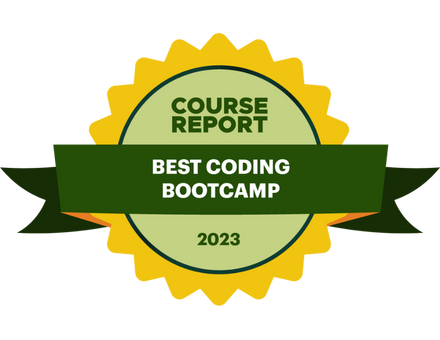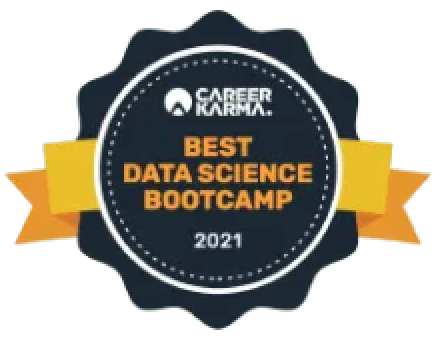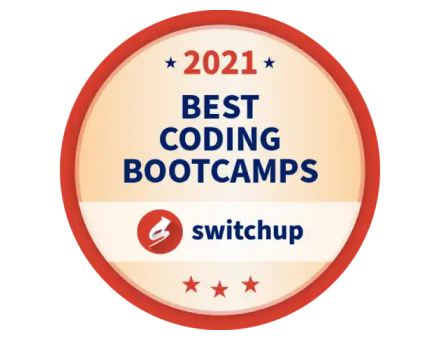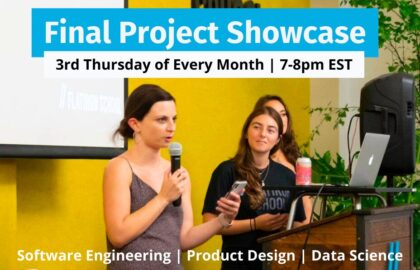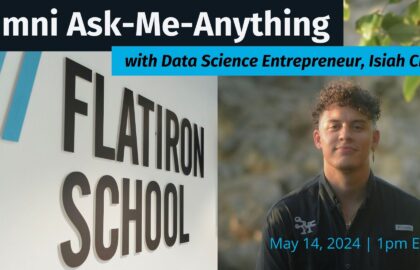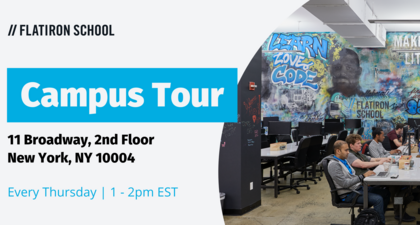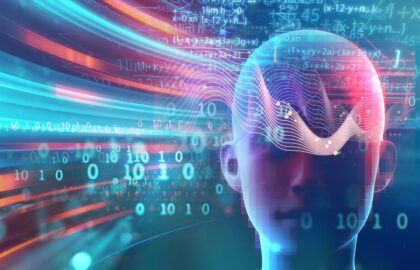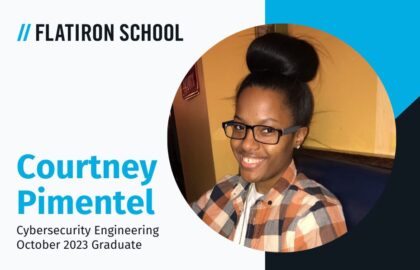
What We Teach

Software Engineering
Gain a foundation in software engineering by building full-stack web applications using back-end and front-end programming languages, frameworks, and artificial intelligence tools.
Possible career paths:
Full Stack Developer, Web Developer, Software Engineer, and Prompt Engineer.

Data Science
Discover how to gather data from various sources as well as apply statistical analyses, artificial intelligence, and machine learning techniques to answer questions and make the information actionable.
Possible career paths:
Data Analyst, Business Intelligence Analyst, AI Engineer, and Data Scientist.

Cybersecurity
Gain a foundation in network and systems security, Python, risk and compliance, logs and detection, threat intelligence, applied cryptography, and how to leverage artificial intelligence tools.
Possible career paths:
Cyber Engineer, Penetration Tester, Security Analyst, and Security Consultant.

UX/UI Product Design
Gain a foundation in design through a holistic approach: credible research methods using artificial intelligence (AI) tools, product sense and strategy, UX and UI, and inclusive design.
Possible career paths:
Product Designer, UX Designer, UX Researcher, Web Designer, and UI Designer.
Choose a course pace that meets the speed of your life.
Some of our students are able to attend their coding courses on a campus full-time, while others have to account for jobs, family, or other personal obligations. Either path you choose, coding bootcamps will require dedication and hard work. In a matter of weeks, you’ll learn skills that can change your future for the better.
Full-Time
Learn like it’s your top priority. Think of this one as the fast-track schedule with lots of accountability.- 15 weeks long
- Daily touchpoints with your cohort, group work with instructor help, paired programming sessions, lab time with instructional staff, and community support.
- Best for: students who want to lean into live lectures, a structured schedule, and learning in community with other students.
- Available: in-person and online
Part-Time
You’re dedicated to learning, but need some schedule flexibility. You set your own schedule but still hit deadlines.- 40 weeks long
- Set your own hours
- Mostly recorded lectures, with optional live weekly lectures and office hours, weekly check-ins with instructors, ability to chat with classmates and instructors via Discord.
- Best for: working professionals that need to fit class into their already-busy schedule.
- Available: online only
Try our Free Tech Prep Lessons
Try a free tech prep offering to find out more about what it would be like to learn with us in a coding course. The goal here is to teach you the basics and see if coding bootcamps are right for you.
Software Engineering
Get some coding knowledge under your belt in HTML, CSS, Javascript, and more.
Data Science
Learn Python essentials, data visualization, and more in this intro to data science.
Cybersecurity
Understand the basics of cybersecurity — networks, linux, and python basics.
UX/UI Product Design
Understand product design tools and differences between UX and UI design techniques.
Our Awards

Learn More About Our Coding Bootcamps
There’s a lot to consider when choosing a coding course – check out our blog for alumni stories, industry trends, and career advice.
Frequently Asked Questions
While they vary with each course and each school, online coding bootcamps are short-term and often rigorous training programs to help students learn the programming languages and development skills they need to work in tech.
Coding bootcamps offer a lot of things. They offer an opportunity to learn the skills you need to launch a career at a relatively affordable and fast pace.
What’s required of you is to find the right bootcamp. Find a place that teaches in a way that fits your learning style, meets your price point and schedule, and focuses on the languages and skills that align with your career ambitions. If you do your research and find the right place for you, then attending the right bootcamp is definitely the right choice.
Employers value people who can do the job and who can learn and adapt quickly on the job. By successfully completing a bootcamp, you’re demonstrating that you can “do” as evidenced by your projects, and that you can “learn” as evidenced by completing the program.
At Flatiron School, you’ll be able to demonstrate both. You’ll learn how to learn because new technologies, programming languages, and tools appear on the market everyday. Our approach enables graduates to learn and apply new tools when needed. In other words, it’s not just the skills themselves that are important to hiring managers, but how you go about acquiring skills to complete a job that sets you apart.
In many ways, coding bootcamps definitely do work, and there’s a lot of proof behind that statement.
But it’s better to first ask yourself, “What do I want to get out of attending a coding bootcamp?” Asking yourself what your goals and ambitions are is how you’ll know if a bootcamp would work for you.
Some people want to just become acquainted with code, which is great, but a full-time bootcamp might not be the best route if you’re looking for a basic understanding of coding.
If your goal is to learn to the skills you need to land a job in tech, then yes, coding bootcamps do work.
We don’t require you to have prior experience to apply for any of our coding bootcamps. Our admissions requirements are being at least 18 years old, having a high school diploma, a GED or equivalent credential, having a native or highly proficient fluency in English, and completing the admissions process.
Before joining your cohort on Day 1, you will have to complete around 40 hours of coursework called Prep to learn the basics so you are prepared to get started straight away.
On-campus programs are 15-weeks long, and are held full-time and you are expected to be on campus for each day of class from 9am – 6pm local time. The Live program is also 15 weeks, but rather than going to a campus, you’ll be logged on and learning remotely full-time. Both on-campus and Live programs monitor attendance daily. The Flex program gives students up to 60 weeks to complete the curriculum, and offers the most flexibility day to day. Students enrolled in Flex programs must attend 10 check-ins in order to be eligible for graduation but are not otherwise required to attend live instructional activities.
The price of our courses reflect our unique approach to learning and support. There are many free resources that can help you learn any discipline, but given the complexity of the topic they can be difficult to navigate independently. Furthermore, students often rave about the camaraderie they establish with instructors, other students, coaches, and alumni – all valuable networking opportunities when it comes to a job search. Our courses and support after graduation are built specifically to provide the structure and community that’s required to be successful.
As for our more traditional competitors – those who are priced similarly and offer live instruction – most haven’t been around as long as Flatiron School, so they may not have the same depth of expertise, employer partner relationships, or alumni network.
The first step is to fill out a written application. Once submitted, you will receive prompts from the admissions team to schedule an interview and take a 15 min aptitude assessment. During the interview a member of the admissions team will learn about your learning needs, career goals, and help you decide whether the program is the right fit for you. If you passed your assessment, we will give you the admissions decision after your interview.
You have a few options in terms of financing your enrollment in one of Flatiron School’s courses. See all of your options on our Tuition & Financing page.
We also offer initiatives that can help to offset the cost of tuition on our Scholarships and Diversity Initiatives page.
The Flatiron School Career Services team exists to help get you hired. You’ll receive guidance on how to:
- Build and Optimize your LinkedIn Profile and Resume
- Ace your behavioral and technical interviews
- Grow your network of tech professionals
- Connect with Flatiron School employer partners
- Negotiate your salary
- Optimize your job search using AI
- Track job search activity using Huntr
You’ll partner with a dedicated Career Coach regularly to make forward progress each week, with up to six months of one-on-one support after graduation.
Our graduates have and continue to make lasting impact in a range of companies from small startups to Fortune 500 companies.
Companies who have hired our grads include:
- Apple
- Microsoft
- IBM
- Shopify
- VOX
- BuzzFeed
- Spotify
- Accenture
- Intel
- Kickstarter
- The New York Times
- Thought Works
- Goldman Sachs
- PWC
- Citi Bank
- Dow Jones
- Akamai
You can view our latest job placement rates in our Jobs Report.
We’ve issued a third-party examined Jobs Report each year since 2014 and remain committed to honesty and transparency with student outcomes.
If you would like to connect with a member of our team, please simply schedule a chat with one of our Admissions representatives.
